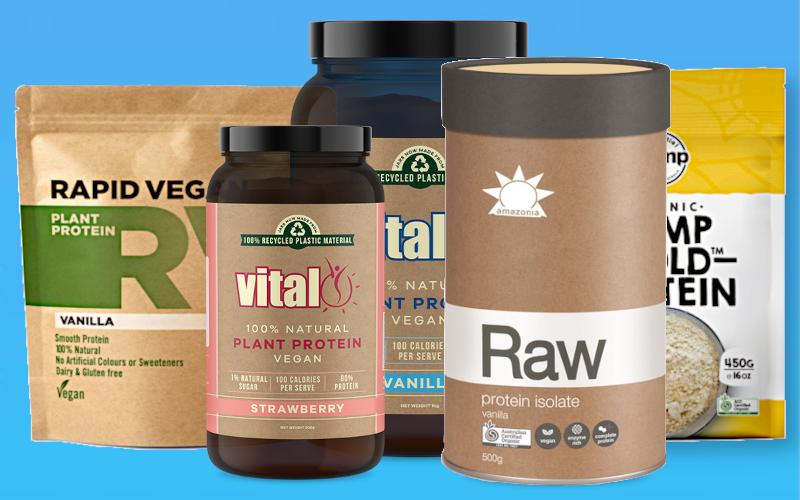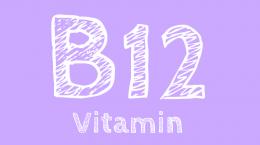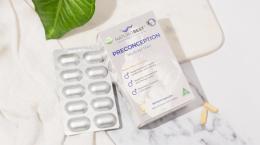Learn About Plant Based Protein Powder - The Ultimate Guide

One of the drawbacks of a vegan or vegetarian diet is that getting enough good-quality protein each day can be challenging, especially if you have high demands like athletes do. Plant-based protein powder is a wonderful way to ensure you're getting enough protein in your diet.
What is plant-based protein powder?
Plant-based protein powder is a vegetarian supplement that contains amino acids and proteins derived from rice, legumes, nuts, and seeds.
Unlike traditional animal-based protein powders, plant-based protein powders are free of animal ingredients such as eggs, casein, and whey.
Plant-based protein vs animal protein powder
The most significant difference between a plant-based protein and an animal protein powder is the protein source, which is whey, casein, or egg in the latter.
Let's see how they stack up in nutrition, digestion, and flavour.
Nutrition
When it comes to calories of carbohydrates there isn’t much of a difference, but this is also greatly dependant on whether sweeteners or flavours are used. They both have roughly equal fat but it’s often higher in plant-based proteins such as seeds and nuts. Animal-based protein powders are slightly more expensive per serving and contain all nine amino acids.
In terms of micronutrients plant proteins frequently provide a greater variety of micronutrients and are higher in some, such as fibre and iron. They also have a higher fibre content per serving. On the other hand, animal protein powders have a lower salt content and a more elevated calcium and potassium content.
Digestion and absorption
Because most plant-based proteins are lactose-free, they are easier to digest than animal-based protein powders like whey and casein. As a result, they're frequently a smart choice for stomach-sensitive people. Simply read the ingredients and seek for a "vegan" label to spot any sneaky dairy additives.
Do plant-based protein powders work to build muscle?
Plant-based protein can be used to develop muscle instead of typical protein sources (such as whey protein). Protein powder is popular among athletes, gym-goers, bodybuilders, and anybody trying to boost their strength and muscle mass because it helps build and maintain lean muscle mass in the body.
Like whey protein powder, plant-based proteins contain BCAAs (branch chain amino acids). These are required to increase protein synthesis, which is necessary for muscular growth and strength.
While there are some obstacles to using plant-based protein powder to grow muscle, it is critical to select the proper protein source for your body that is of excellent quality. Track your intake, stay consistent, eat well, and, as always, lift heavy when it comes to muscle gain.
How to use plant-based protein powders
Adding your plant-based protein powder to a pre-workout shake will help you get more out of your workout by raising your energy levels and increasing your power and endurance. It's ideal to have a smoothie or shake 45 minutes before your workout to guarantee you get all of the advantages in the allotted time.
Following a workout with a protein shake, smoothie, or protein ball is advantageous since it provides muscles with the necessary nutrients and amino acids. This will aid in relaxation and repair, lowering fatigue, aches and pains, and assisting the body in recuperation, ideal for individuals who want to exercise regularly.
Before adding the plant-based protein powder, make sure you have your drink (water, milk (oat / rice / almond / dairy) or even yoghurt) ready.
- Blend your smoothie or shake well in a blender, bullet, or protein shaker bottle. Don't use a spoon to mix your protein powder into a beverage.
- If you're using a shaker bottle, consider one with a mesh screen or a metal ball whisk to keep lumps at bay.
- Protein powder can also be used for smoothie bowls, chia puddings, baked products, and even yoghurt and fruit!
- Experiment with different ingredients. Combine your protein powders with nuts, fruits, oats, and superfoods to make nutritious and, more importantly, delicious dishes to enjoy at home, at work, or on the go.
Our recommendations
We recommend doing some research and trying out different plant-based options that work best for you. To help guide you here are the four main plant-based protein powders:
Pea Protein
Pea protein has exploded in popularity because it includes all nine essential amino acids and is high in BCAAs. Pea protein is also high in iron and is hypoallergenic, making it ideal for vegetarian or vegan diets.
Pea protein has been linked to greater muscular growth, decreased appetite, and improved heart health. It has a greater sodium content than some other protein sources, so keep that in mind if you need to watch your sodium intake for health reasons.
In a 30g serving of pea protein powder, roughly 25gs of protein isolate are present.
Some of our favourite Pea Protein Powders:
Brown Rice
Brown rice is high in fibre and includes important minerals such as iron, calcium, and vitamin C. It doesn't contain lactose; it's also hypoallergenic, making it a popular choice for folks who have allergies or gastrointestinal troubles after consuming whey or pea protein.
Although brown rice protein powder provides all nine essential amino acids, it’s not considered to be as good as pea protein due to the low lysine level. Each 30g serving includes roughly 24gs of protein isolate.
Some of our favourite Brown Rice Protein Powders:
- Amazonia Raw Protein Isolate | Choc & Coconut
- Nutra Organics Clean Protein | Vanilla Cookie Dough
- Nutridoc Sprouted Brown Rice Protein | Vanilla | with Carnitine
Hemp
Hemp is a plant-based protein with a nutritional profile that is gaining popularity. Hemp protein is abundant in fibre and omega-3 fatty acids and provides all nine necessary amino acids.
Hemp protein is less processed than most other plant proteins on the market, which is beneficial if you prefer to eat mostly whole foods. It's also simple to digest and absorb, and it's been proved to be friendly to the digestive system.
It contains less protein than pea protein (about 15gs per 30g serve) and has fewer BCAAs than pea protein.
Some of our favourite Hemp Protein Powders:
Quinoa, chickpea, pumpkin seed, sunflower seed, chia seed, and flax seeds are other plant-based protein powders. A plant-based protein powder with various nutrients will help you receive enough amino acids and benefit from nutrient variety.
When introducing protein into your daily regime, make sure to speak to your healthcare professional.
The information presented in this article is intended to be general in nature. Always seek medical advice from your qualified practitioner before using any supplements or following any information presented.
Click Here to view all Protein Powders







